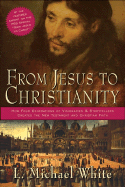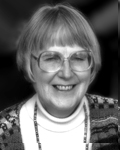
The Spring 2007 meeting of Westar Institute is going to be February 28-March 3 in Miami. It is going to be a good one. James Veitch's presentation is entitled "Killing for God." Here is a summary:
September 11 is a critical defining moment for all of us who live in the English speaking Western world. It has brought into sharp relief the possibility of an ongoing 'clash of civilizations.' Killing for God and in the name of God have become trademarks of the conflict in the Middle East and elsewhere. This presentation reconstructs the important milestones in the pathway to September 11 and the response that created the 'war on terror.' It will address questions like: who are the 'terrorists,' what do they want, and why do they act in the ways that they do? And it will ask whether religious faith can be harnessed to empower the peace process instead of empowering terror.

L. Michael White will speak about Christian origins with his presentation: "Rediscovering the Earliest Jesus Movement." He has written a helpful book on Christian origins and places each New Testament writing as well as extra-canonical works in their historical setting.

His book is entitled, "From Jesus to Christianity."
It has become a commonplace these days to recognize the Jewishness of Jesus and his first followers. But it still comes as a surprise to some to hear that the earliest Jesus Movement remained a thoroughly Jewish sect throughout its first and even second generations, down to at least the end of the first century ce. This series will look at the evidence and patterns of development in the Jesus sect during the first and second generation with special focus on the form of the sect located in and around the Galilee, specifically that associated with the Gospel of Matthew, and will include discussions of the cultural history of the region in light of historical and archaeological evidence and how such information may illuminate the text.

Joanna Dewey will speak about the importance of oral tradition in reconstructing early Christian history. Her presentation is entitled "Oral Communication and Manuscripts."
In antiquity, only about five per cent of the population were literate and, except among the elite, manuscripts were few and far between. Yet most of our scholarly reconstruction of Christian history has been based on our own experience of print media, that is, on assumptions that early Christians relied on fixed texts that were readily available. In fact most knowledge was transmitted orally and manuscripts mostly served as an aid to oral memory. Knowledge of the first-century media world both helps us to understand early Christianity and complicates our quest for certainty. This lecture will explore some implications for reconstructing early Christianity.
In addition to the presentations, the various seminars will deliberate including the new Jesus Seminar on Christian Origins. At the Spring 2006 meeting, they made some interesting conclusions. The latest issue of The Fourth R reported on this seminar and the Acts Seminar. Here are some of the "red letter" and "black letter" (red is a 'yes' consensus among the fellows and black is a 'no' consensus) statements about early Christian origins and the Acts of the Apostles:
Did Christianity begin with the Resurrection?
(again black bullet statements=no,
red bullet statements=yes)
- Christianity began with the resurrection of Jesus.
- In Christian theology the resurrection has functioned to authorize Christian faith and practice by connecting it to the transcendent world, not as an account of how Christianity began.
- Christianity began with the event of Pentecost described in Acts 2.
- Christianity began as a movement within Judaism; it would not become recognizable as a distinct new religion until many years later, after the first generation of Jesus' followers had passed from the scene.
Did Christianity begin with Paul?
- Paul was the founder of Christianity.
- Christianity began as a movement among Jews. I would not become recognizable as a distinct new religion until many years later, after the first generation of Jesus' followers had passed from the scene.
Did Christianity begin with Jesus?
- Christianity began with Jesus.
- Jesus of Nazareth should be included in the discussion of Christian origins.
So not Resurrection, not Pentecost, not Paul, not Jesus. The work continues. Here are some conclusions regarding the Acts of the Apostles:
- The Acts of the Apostles is best understood as a myth of Christian origins.
- The Acts of the Apostles should not be employed as the basis for a historical study of Christian origins.
- The Acts of the Apostles is not a primary source for Pauline biography or Pauline chronology.
- The Acts of the Apostles is more valuable for second-century Christianity than for first.
I belong to the Literacy and Liturgy Seminar. Here is its description:
The Literacy and Liturgy Seminar is composed of both individual Fellows of the Jesus Seminar and religious professionals, clergy and lay, who are interested in disseminating the work of the Jesus Seminar. This seminar serves as a bridge between the work of the Jesus Seminar and faith communities, study groups and individuals who want to use the scholars' research to raise the level of religious literacy, both in the churches and in the wider culture. This seminar will seek to make the knowledge and insights generated by the Jesus Seminar more widely known among both religious communities and others who are concerned with the role of religion in modern society and culture.
Considering the results of scholarly research can help people of faith and their communities examine and reflect on their received traditions and find new ways of expressing religious meaning. In light of that recognition this seminar will seek to foster new forms of religious language, education, music, and ritual in light of contemporary scholarship on the historical Jesus, Christian origins, and on the Christian tradition throughout its long history.
More on what that seminar will be doing in a future post. Here are various testimonies from scholars on Why Westar Institute is important. I highlight this one from Dominic Crossan:
An extremely literalist and fundamentalist understanding of the Christian Bible is presently dominant … in matters from medicine through education to foreign policy. Bob [Funk's] vision of a laity schooled in biblical scholarship—schooled, that is, in an alternative understanding of the Bible based on historical context—is even more desperately needed right now than when Bob created the Jesus Seminar in 1985.
—John Dominic Crossan, Professor Emeritus of Religious Studies, DePaul University, Chicago
Right on, brother Dom.
I have a a copy of White's book on the New Testament. I think it is a wonderful resource, a great survey of the development of Christianity in the first few centuries. It not only covers the canonical books, but also the early Christian writings that were candidates for canonicity (1 Clement, the Didache, and so forth)--which I think any New Testament historical book worth its salt should do--and he summarizes the rage current scholarly consensus on dating and authorship. There is a nice summary box associated with with book of the New Testament that gives the basic details about that book.
ReplyDeleteWhite's book was disappointing. Not only was it a bland rehashing of material that's over fifty years old, but (worse) he doesn't deal with the mountains of evidence that scholars like Larry Hurtado have amassed in favor of an early high Christology (especially as expressed in Christian worship). Hurtado's latest opus on the subject is reviewed here.
ReplyDeleteOddly enough, I also have White's 'from Jesus to Christianity' on my book shelf also - I have read pieces of it but have never sat down and read the book in entireness - but I have skimmed it and do agree it is a good read.
ReplyDeleteI also have just read half-way through 'Whose Bible is it anyway' by Jaroslav Pelikan - and it kind of adresses one of the authors you mentioned who is going to talk about oral and written tradition in the biblical community - and I find this absolutely an awesome book (so far) - I think the lady you have as part of the seminar is on the same tangent.
Sounds like a good seminar.
Hurtado's book looks interesting too - I would read it if I had it - and if I come by it - I'll be sure to buy it. Thanks Chris.
ReplyDelete"So not Resurrection, not Pentecost, not Paul, not Jesus. The work continues."
ReplyDeleteI find this line of reasoning to be somewhat - blinded? I find these people or times as part of the Christian story - of it's elementary beginnings - not a single piece of biblical literature points to the contrary. Neither Paul or Luke's Acts seem to contradict that fact. They both admittedly know this is a small enough faith to monitor in letters and by visits.
"The Acts of the Apostles is best understood as a myth of Christian origins."
This can only make sense if we deny aspects of Luke in general - as unreliable or un-real. The letters do point to Paul and Luke travelling together - and hordes of others. But hey, I am going by the simple text as is - so I could be 'out of my mind' here.
"The Acts of the Apostles should not be employed as the basis for a historical study of Christian origins."
Is this because the book is unreliable as history or as a story?
"The Acts of the Apostles is not a primary source for Pauline biography or Pauline chronology."
On what basis - they have a contradiction or two - or that this history is not verified outside the bible?
"The Acts of the Apostles is more valuable for second-century Christianity than for first."
This question might be easily answered if we knew who Theophilus was (thusly a time-frame for the writing). But it might have been more valuable is an assumption?
I guess I have some questions about the Jesus Seminar - and rightfully so - but I think the study is worthwhile - but from studying the oral tradition of the Jewish and the times of the disciples it isn't unconceivable that a solid oral tradition would be full of mis-leading idea's (taking credibility from the actual writers). Facts haven't quite been established in scriptural authenticity - as of yet - most of it still involving guess-work (on some levels). Who is to say Luke never wrote what he saw? Who is to say the disciples never wrote down their events afterwards - maybe while in Jerusalem? I can't say there is proof for these ideas - but some of the ideas were around even in Paul's letters. I just think some of the looking-back will involve some assumptions - no matter the literary background.
I saw so many typos in my hastily written comment on Whites' book that I wanted to follow up on what I said to make it a little more coherent. White's book may not incorporate everyone's pet author in his sources--I don't recall seeing Bart Ehrman mentioned when I read the book--but as a survey of the written works that constituted revered literature within early Christianity (before the canon was settled upon), and as a survey of the historical context from which those works emerged, I found the book to be excellent.
ReplyDeleteI mentioned the summary boxes for each of the major works of early Christian literature. These boxes represent a nice quick reference tool--showing the ranges of dates suggested by scholars, probable place of origin, and author, along with an outline of the content of the work, and it includes suggestions for further reading about that work. (Some of those suggested readings do go back a few decades, but others are more recent, so it just isn't true that his sources all come from 50 years ago).
White also provides a useful introduction to the structure of letters from that time and how Paul's epistles conformed and didn't conform to that structure. Not that this kind of thing can't be found elsewhere, but I liked the way he approached the subject.
I also really appreciated the way he treated various epistles that were considered sacred by some Christians at the time but which eventually didn't make it into the New Testament canon. This gives a better appreciation that there was no fixed distinction at the time between "biblical" and "extra-biblical" among Christians of that time--because there was no New Testament yet. Instead, there were a series of writings that were found to be important among many Christians, some of which made in into the canon, and some of which did not; for purposes of giving a more comprehensive view of what was taking place in the early Christian movement, it is useful to look at the writings that eventually didn't make it into the New Testament but which were indistinguishably by early Christians.
So, overall, I liked the book quite a bit.